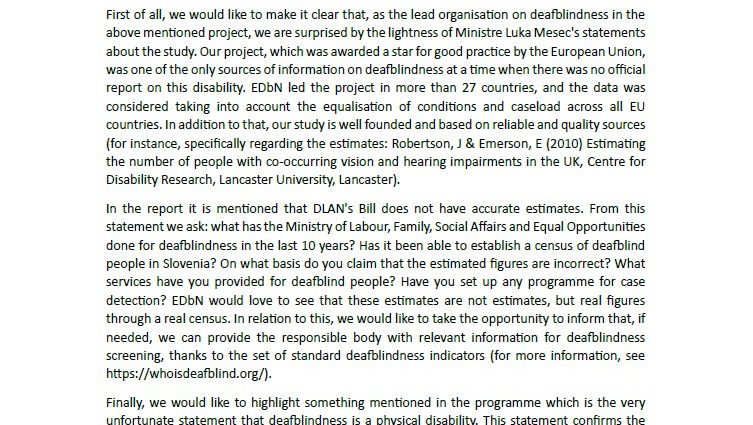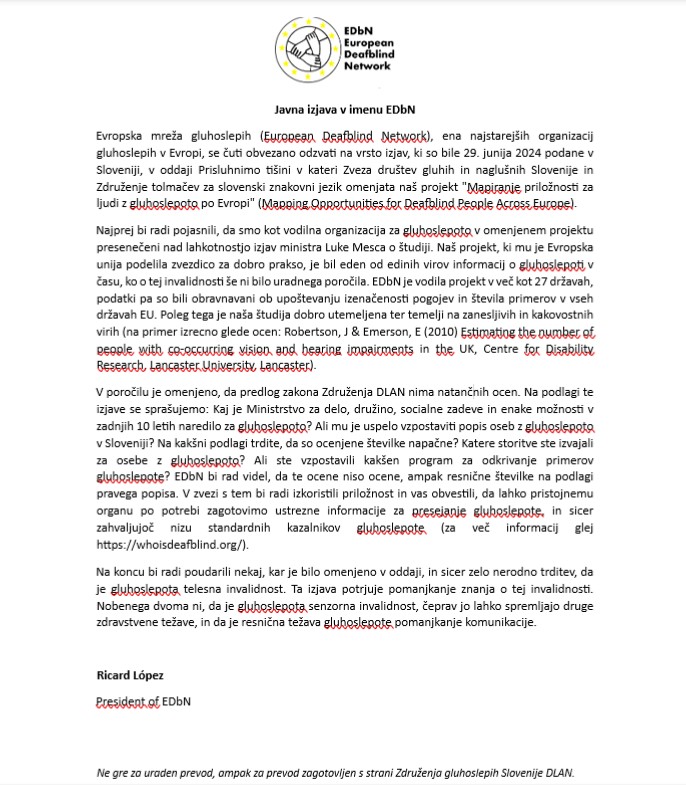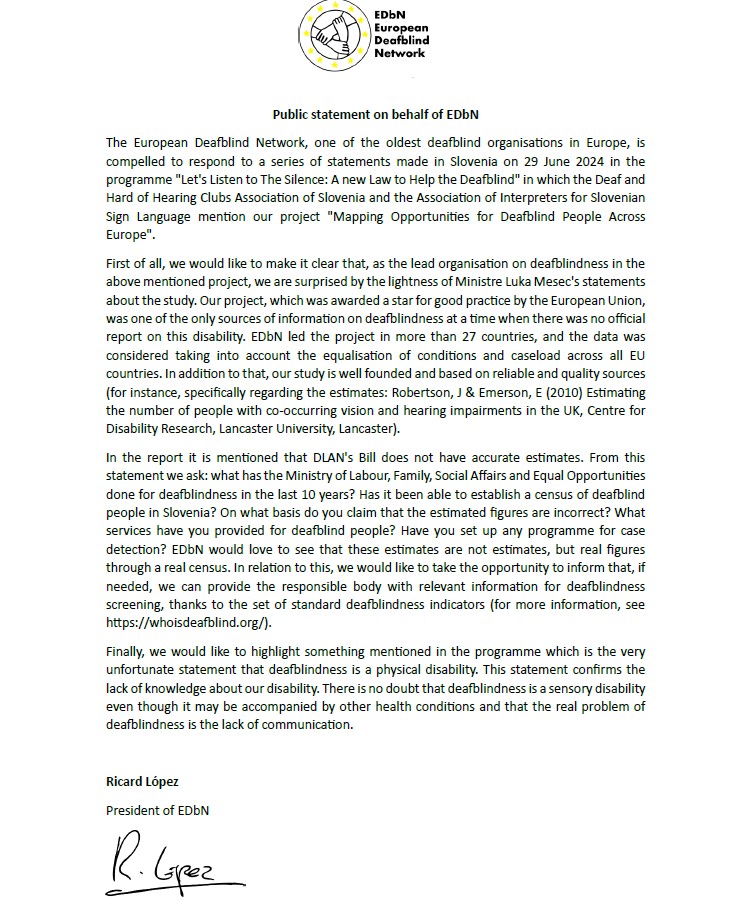We are publishing a public statement by EdbN (European Deafblind Network) in response to the broadcast on 29 June 2024 on RTV SLO “Let’s listen to the silence: a new law to help the deafblind”, prepared by the Slovenian Association of the Deaf and Hard of Hearing.
The public response of the Deafblind Association of Slovenia DLAN to the highlighted programme was published on 3 July 2024.
The EDbN public statement is published in full in the original and in translation. It is also published on the website of the Deafblind Association of Slovenia DLAN.
We are awaiting responses from other foreign organisations, which we will also make public.
The public response of the Deafblind Association of Slovenia DLAN to the highlighted programme was published on 3 July 2024.
The EDbN public statement is published in full in the original and in translation. It is also published on the website of the Deafblind Association of Slovenia DLAN.
We are awaiting responses from other foreign organisations, which we will also make public.
Public statement on behalf of EDbN
The European Deafblind Network, one of the oldest deafblind organisations in Europe, is compelled to respond to a series of statements made in Slovenia on 29 June 2024 in the programme “Let’s Listen to The Silence: A new Law to Help the Deafblind” in which the Deaf and Hard of Hearing Clubs Association of Slovenia and the Association of Interpreters for Slovenian Sign Language mention our project “Mapping Opportunities for Deafblind People Across Europe”.
First of all, we would like to make it clear that, as the lead organisation on deafblindness in the above mentioned project, we are surprised by the lightness of Ministre Luka Mesec’s statements about the study. Our project, which was awarded a star for good practice by the European Union, was one of the only sources of information on deafblindness at a time when there was no official report on this disability. EDbN led the project in more than 27 countries, and the data was considered taking into account the equalisation of conditions and caseload across all EU countries. In addition to that, our study is well founded and based on reliable and quality sources (for instance, specifically regarding the estimates: Robertson, J & Emerson, E (2010) Estimating the number of people with co-occurring vision and hearing impairments in the UK, Centre for Disability Research, Lancaster University, Lancaster).
In the report it is mentioned that DLAN’s Bill does not have accurate estimates. From this statement we ask: what has the Ministry of Labour, Family, Social Affairs and Equal Opportunities done for deafblindness in the last 10 years? Has it been able to establish a census of deafblind people in Slovenia? On what basis do you claim that the estimated figures are incorrect? What services have you provided for deafblind people? Have you set up any programme for case detection? EDbN would love to see that these estimates are not estimates, but real figures through a real census. In relation to this, we would like to take the opportunity to inform that, if needed, we can provide the responsible body with relevant information for deafblindness screening, thanks to the set of standard deafblindness indicators (for more information, see https://whoisdeafblind.org/).
Finally, we would like to highlight something mentioned in the programme which is the very unfortunate statement that deafblindness is a physical disability. This statement confirms the lack of knowledge about our disability. There is no doubt that deafblindness is a sensory disability even though it may be accompanied by other health conditions and that the real problem of deafblindness is the lack of communication.
Ricard López
President of EDbN
Translation:
Javna izjava v imenu EDbN
Evropska mreža gluhoslepih (European Deafblind Network), ena najstarejših organizacij gluhoslepih v Evropi, se čuti obvezano odzvati na vrsto izjav, ki so bile 29. junija 2024 podane v Sloveniji, v oddaji Prisluhnimo tišini v kateri Zveza društev gluhih in naglušnih Slovenije in Združenje tolmačev za slovenski znakovni jezik omenjata naš projekt “Mapiranje priložnosti za ljudi z gluhoslepoto po Evropi” (Mapping Opportunities for Deafblind People Across Europe).
Najprej bi radi pojasnili, da smo kot vodilna organizacija za gluhoslepoto v omenjenem projektu presenečeni nad lahkotnostjo izjav ministra Luke Mesca o študiji. Naš projekt, ki mu je Evropska unija podelila zvezdico za dobro prakso, je bil eden od edinih virov informacij o gluhoslepoti v času, ko o tej invalidnosti še ni bilo uradnega poročila. EDbN je vodila projekt v več kot 27 državah, podatki pa so bili obravnavani ob upoštevanju izenačenosti pogojev in števila primerov v vseh državah EU. Poleg tega je naša študija dobro utemeljena ter temelji na zanesljivih in kakovostnih virih (na primer izrecno glede ocen: Robertson, J & Emerson, E (2010) Estimating the number of people with co-occurring vision and hearing impairments in the UK, Centre for Disability Research, Lancaster University, Lancaster).
V poročilu je omenjeno, da predlog zakona Združenja DLAN nima natančnih ocen. Na podlagi te izjave se sprašujemo: Kaj je Ministrstvo za delo, družino, socialne zadeve in enake možnosti v zadnjih 10 letih naredilo za gluhoslepoto? Ali mu je uspelo vzpostaviti popis oseb z gluhoslepoto v Sloveniji? Na kakšni podlagi trdite, da so ocenjene številke napačne? Katere storitve ste izvajali za osebe z gluhoslepoto? Ali ste vzpostavili kakšen program za odkrivanje primerov gluhoslepote? EDbN bi rad videl, da te ocene niso ocene, ampak resnične številke na podlagi pravega popisa. V zvezi s tem bi radi izkoristili priložnost in vas obvestili, da lahko pristojnemu organu po potrebi zagotovimo ustrezne informacije za presejanje gluhoslepote, in sicer zahvaljujoč nizu standardnih kazalnikov gluhoslepote (za več informacij glej https://whoisdeafblind.org/).
Na koncu bi radi poudarili nekaj, kar je bilo omenjeno v oddaji, in sicer zelo nerodno trditev, da je gluhoslepota telesna invalidnost. Ta izjava potrjuje pomanjkanje znanja o tej invalidnosti. Nobenega dvoma ni, da je gluhoslepota senzorna invalidnost, čeprav jo lahko spremljajo druge zdravstvene težave, in da je resnična težava gluhoslepote pomanjkanje komunikacije.
Ricard López
President of EDbN
Ne gre za uraden prevod, ampak za prevod zagotovljen s strani Združenja gluhoslepih Slovenije DLAN.




